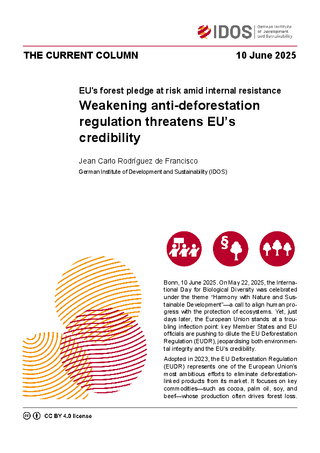EU's forest pledge at risk amid internal resistance
Weakening anti-deforestation regulation threatens EU’s credibility
Rodríguez de Francisco, Jean CarloThe Current Column (2025)
Bonn: German Institute of Development and Sustainability (IDOS), The Current Column of 10 June 2025
Bonn, 10 June 2025. On May 22, 2025, the International Day for Biological Diversity was celebrated under the theme “Harmony with Nature and Sustainable Development”—a call to align human progress with the protection of ecosystems. Yet, just days later, the European Union stands at a troubling inflection point: key Member States and EU officials are pushing to dilute the EU Deforestation Regulation (EUDR), jeopardising both environmental integrity and the EU’s credibility.
Adopted in 2023, the EU Deforestation Regulation (EUDR) represents one of the European Union’s most ambitious efforts to eliminate deforestation-linked products from its market. It focuses on key commodities—such as cocoa, palm oil, soy, and beef—whose production often drives forest loss. Under the EUDR, companies placing these products on the EU market must conduct thorough due diligence to prove that their goods are not sourced from land subject to deforestation or forest degradation. They are required to submit a due diligence statement backed by evidence, such as geolocation data and supply chain documentation, demonstrating compliance. Operators and traders are legally responsible for ensuring products meet the regulation’s requirements, and they may face significant penalties, including fines and market bans, in case of violations. Enforcement is the responsibility of national competent authorities within EU member states, who will conduct checks, audits, and investigations. These authorities are also empowered to impose sanctions, seize non-compliant goods, and suspend market access. The EUDR thereby combines environmental protection with legal accountability, promoting sustainable land use and safeguarding biodiversity.
Despite its significance, the regulation now faces internal resistance. In October 2024, the European Commission proposed a 12-month delay—just a week after reassuring stakeholders of timely implementation. The European Parliament and Council subsequently agreed upon this proposal, pushing the implementation dates to December 30, 2025, for large and medium-sized companies, and June 30, 2026, for micro and small enterprises.
In May 2025, eleven Member States—Austria, Luxembourg, Bulgaria, Croatia, Czech Republic, Finland, Italy, Latvia, Portugal, Romania, and Slovenia—called for sweeping changes to the EU Deforestation Regulation (EUDR), including the introduction of a new “very low-risk” or “zero-risk” country category, which does not currently exist under the regulation. This proposed category would significantly reduce the compliance obligations for imports from designated countries. Specifically, operators importing from “very low-risk” countries would be exempt from certain due diligence requirements, such as the obligation to collect detailed geolocation data or conduct full supply chain risk assessments.
Critics warn that introducing such a category could create serious loopholes and undermine the law’s effectiveness. If countries are prematurely or politically designated as “very low-risk,” goods linked to deforestation could enter the EU market with minimal scrutiny. This concern is especially acute given that major exporters like Brazil, Malaysia, and Indonesia remain classified only as “standard risk” despite persistent deforestation in those regions. Weakening due diligence requirements for any country could compromise the EUDR’s core objective of breaking the link between EU consumption and global forest loss.
This backtracking of the EUDR sends a contradictory message. The EUDR is a decisive test for whether Europe is willing to match its green rhetoric with decisive action. Weakening it would undercut global momentum toward deforestation-free supply chains and embolden those seeking to undermine environmental safeguards.
Yes, implementation poses challenges—also for smallholders. The solution, however, lies not in lowering the bar, but in supporting equitable, effective enforcement: through technical assistance, fair timelines, and robust traceability tools. That is how the EU can truly live up to its often-stated commitment to biodiversity.
At a time of accelerating biodiversity loss and climate change—crises in which forests play a crucial role—the world is watching. Leaders are being called to honour their environmental commitments. Now is not the time for the EU to retreat. The EUDR is more than just a regulatory milestone; it is a vital promise to protect forests, uphold the rights of Indigenous Peoples, local communities , and forest defenders, and safeguard the planet. It must be implemented fully—not weakened for short-term convenience.


